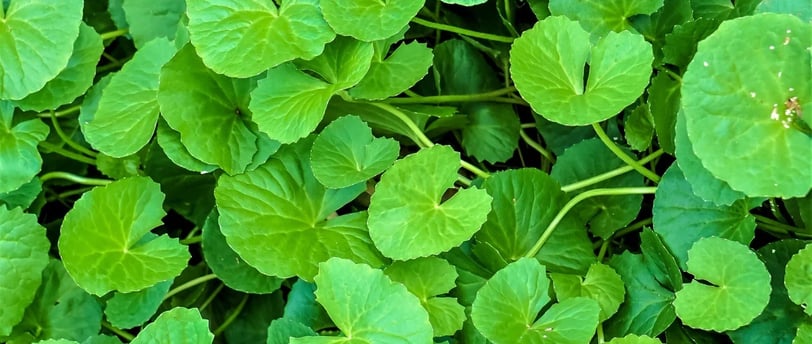Health Benefits of Gotu Kola: A Complete Guide to This Ancient Herb
HERBAL INSIGHTS


Gotu kola (Centella asiatica) has been revered for centuries in traditional medicine systems, including Ayurveda, Traditional Chinese Medicine (TCM), and other holistic practices, for its numerous health benefits. This herb, often referred to as the “herb of longevity,” is gaining popularity in modern wellness circles for its ability to support brain health, promote healthy skin, and improve circulation. In this article, we’ll explore the health benefits of gotu kola, including the common symptoms and causes it addresses, the various forms available, how to use it, recipes, dosages, side effect precautions, and the scientific evidence behind its efficacy.
What Is Gotu Kola?
Gotu kola is a small, perennial herb native to Asia and Africa, prized for its adaptogenic properties and ability to promote healing. Rich in bioactive compounds such as triterpenoids, flavonoids, and saponins, gotu kola serves as a natural remedy for various physical and mental health conditions. Known as the "elixir of life," it is commonly used today to support cognitive health, wound healing, stress reduction, and cardiovascular health.
Forms Available
Gotu kola is accessible in multiple forms, each suitable for a variety of usages and preferences:
Powder: Gotu kola powder is versatile and can be added to smoothies, soups, or herbal teas.
Capsules and Tablets: Convenient for precise dosages, this is the most common form for supplementation.
Tinctures and Extracts: Liquid extracts are highly concentrated and easy to mix into water or juice.
Dry Leaves/Tea: Dry gotu kola leaves are frequently used in herbal teas.
Topical Creams and Ointments: These forms promote wound healing and improve skin conditions.
Essential Oils: Rare but potent, gotu kola essential oil can be used in aromatherapy.
Common Symptoms and Causes Gotu Kola Addresses
The health benefits of gotu kola help manage numerous symptoms and their underlying causes. Here are some common issues it helps address:
Stress and Anxiety: Its adaptogenic properties help manage cortisol levels and calm the mind.
Cognitive Decline: Individuals prone to memory loss or brain fog can benefit from its neuroprotective effects.
Poor Blood Circulation: Gotu kola strengthens veins and capillaries, improving symptoms of venous insufficiency.
Skin Issues: Known for its collagen-boosting properties, it addresses wrinkles, scars, and wounds.
Low Energy Levels: By supporting adrenal function, gotu kola enhances physical and mental stamina.
How to Use Gotu Kola
For Cognitive Health: Take capsules or tinctures daily as per the recommended dosage.
For Skin Health: Apply a gotu kola-infused cream to affected areas.
For General Wellness: Brew dried leaves into tea or sprinkle powder into your meals.
In Recipes: Try a refreshing gotu kola smoothie or add it to soups for a nutritious boost. Here’s a simple recipe:
Gotu Kola Tea Recipe
Ingredients:
1 teaspoon of dried gotu kola leaves
1 cup of hot water
Optional: honey or lemon for flavor
Instructions:
Steep the leaves in hot water for 5–10 minutes.
Strain and sweeten, if desired. Enjoy warm.
Dosage Recommendations
The recommended dosage depends on the form consumed:
Capsules: 300-500 mg per day, divided into two doses.
Powder: ½ to 1 teaspoon (around 2-4 grams) per day.
Tinctures: 20-30 drops or as advised by a healthcare provider, mixed in water.
Topical Use: Apply as per product instructions.
It’s essential to start with the lowest dose, especially if you’re trying gotu kola for the first time. Consult a healthcare professional, particularly if you’re pregnant, nursing, or have existing medical conditions.
Scientific Evidence Supporting Gotu Kola Benefits
Modern science backs many traditional claims about gotu kola. Here’s a look at the research:
Supports Brain Function: Studies published in Evidence-Based Complementary and Alternative Medicine confirm that gotu kola enhances memory and cognitive function, proving valuable for age-related cognitive decline and Alzheimer’s Disease.
Improves Circulation: A study in the Journal of Angiology found that gotu kola promotes better circulation and reduces symptoms of venous insufficiency, such as leg swelling and discomfort.
Boosts Wound Healing: Research in the International Journal of Lower Extremity Wounds highlights the herb’s ability to stimulate collagen synthesis, hastening wound healing and reducing the visibility of scars.
While further trials are necessary to solidify these findings, initial results are highly promising.
Side Effect Precautions
While generally considered safe, gotu kola may cause mild side effects in some individuals, especially at higher doses:
Dizziness
Upset stomach
Skin irritation (when used topically)
Precautions:
Avoid long-term use beyond 6-8 weeks without a break.
Pregnant and breastfeeding women should consult a doctor before use.
Individuals with liver conditions should use with caution, as gotu kola may impact liver function.
Do not use alongside sedatives or other medications without professional advice.
Conclusion
Gotu kola is a versatile herb that offers a wealth of health benefits, addressing symptoms of stress, cognitive decline, poor circulation, and skin conditions. With various forms available, including capsules, tea, and topical creams, it’s easy to incorporate into your daily routine. While scientific evidence supports many of its traditional uses, remember to start with a low dose and consult with a healthcare professional to ensure safety, particularly if you have existing health concerns.
Discover the wonders of gotu kola for yourself, but do so with care and awareness. This ancient remedy may be the answer to improving your well-being naturally and holistically.
References
Bylka, W., et al. “Centella asiatica in Dermatology: An Overview.” Phytotherapy Research, 2014.
Choudhry, H.Z., et al. “Gotu Kola and Its Role in Enhancing Cognitive Function.” Journal of Ethnopharmacology, 2021.
Widgerow, A.D. “The Role of Botanical Extracts in Wound Healing.” International Journal of Lower Extremity Wounds, 2012.
